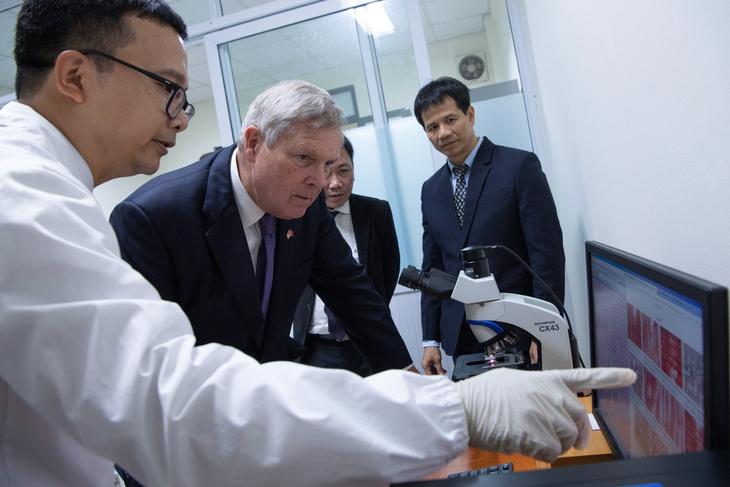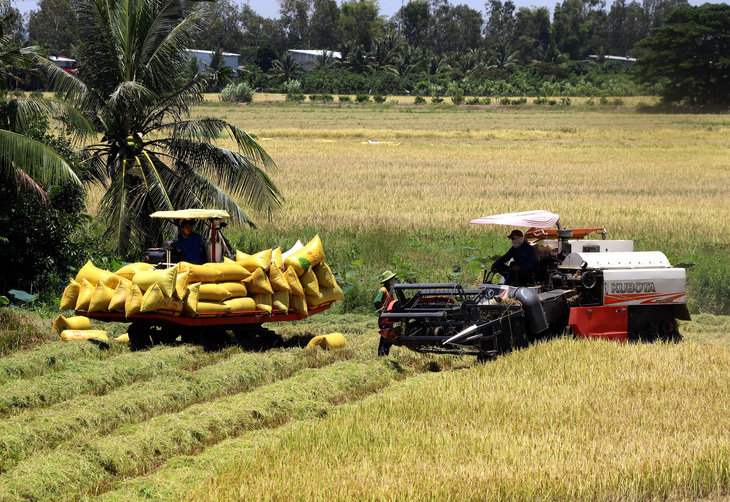The U.S. will provide financial support for a project in Vietnam which is aimed at developing one million hectares of high-quality rice paddies and reduce emissions by 2030, U.S. Secretary of Agriculture Thomas J. Vilsack affirmed at a press conference in Hanoi on Wednesday.
The project, launched by the Vietnamese Ministry of Agriculture and Rural Development, carries an estimated price tag of at least VND40 trillion (US$1.7 billion).
“The U.S. and Vietnam share a common vision on agriculture that adapts to climate change and global food security," Vilsack said.
“The U.S. is committed to sharing information and best farming practices to help Vietnam adapt to climate change."
The world’s biggest economy will also promote a program focused on the use of appropriate fertilizers capable of improving Vietnamese rice productivity and proliferating sustainable agriculture, the U.S. official said.
The initiative's primary aim is to support, but some of its projects can be applied to Vietnam, including those meant to reduce emissions during rice production, Vilsack noted.
The two countries will continue exchanging experience in rice cultivation through learning exchange programs between U.S. and Vietnamese experts.
Vilsack also expected a Vietnamese delegation to visit the Agriculture Innovation Mission for Climate, set to take place in Washington D.C. early next month, which aims to accelerate innovations in agriculture to adapt to climate change.
The initiative has so far committed $10 billion to supporting farming techniques in response to climate change in developing countries, including Vietnam, but that commitment is expected to grow.
|
|
| Vietnamese farmers harvest high-quality rice in the Mekong Delta province of An Giang. Photo: Chi Quoc / Tuoi Tre |
Regarding Vietnam’s role in the global food security, Vilsack pointed out that the Southeast Asian country is one of the world’s leading rice producers.
In order to combat climate change, Vietnam has to produce food using less land, water, and energy, thereby reaching its net-zero emissions target by 2050.
“The global population is increasing and we need to think about how we will ensure food for such a population without using much more resources," Vilsack said.
“I believe that by coordinating with each other, we can improve productivity and ensure food security for mankind in a sustainable way."
He also advised Vietnam to improve its legal system and testing regulations in order to ensure food quality and the country’s agricultural products are able to reach more markets.
Secretary Vilsack paid a visit to Vietnam from Sunday to Thursday. This is his third visit to the Southeast Asian country.
Responding to climate change has been a priority for Vietnam-U.S. cooperation over the 10 years of their comprehensive partnership, Vilsack said at a meeting with students of the Foreign Trade University in Hanoi on Wednesday.
Discussing the Indo-Pacific Economic Framework for Prosperity (IPEF), the U.S. official said the IPEF would help reduce and remove non-tariff barriers for sustainable and eco-friendly products and the U.S. will support Vietnam in benefiting from the framework.
Like us on Facebook or follow us on Twitter to get the latest news about Vietnam!




















































